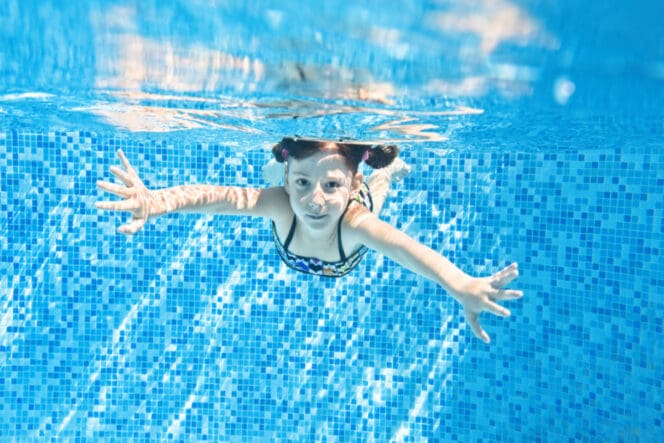Swimming with your contact lenses in place is a bad idea. You should remove your contacts and use alternative eyewear like glasses or goggles. Protecting your eyes will prevent them from being damaged or your eyesight from being harmed.
What Are the Risks of Swimming with Contacts In?
The problem with leaving your contacts in while you swim is not the exposure to water. It is the exposure to what is in the water.
Pool water is full of chlorine and other harsh chemicals. Pool water also contains a host of other germs and microbes that chlorine doesn’t have any effect on.
Swimming in a lake or pond can expose your contacts to even more harmful bacteria. Your risk of an eye infection dramatically increases. Any type of water will cause a contact lens to shrink or tighten against your eye. This can trap bacteria and other microscopic debris between both surfaces.
The health of your eyes, as well as your eyesight, is at stake if you leave your contacts in when you swim. The best way to solve this problem is to carry your contact lens accessories with you so you can take your lenses out and store them safely.
Common Swimming-Related Eye Issues
Swimming in a chlorinated pool with your contact lenses in can lead to redness, itching and irritation. You wear your contacts comfortably because they slide across a thin film of tears that coats your corneas. Chlorine breaks down that film, causing your eyes to feel dry and irritated.
People who do not wear contacts can experience dry, itchy eyes because of the breakdown of the delicate film of tears. Having your contacts in your eyes while you swim will dramatically increase the irritation and aggravate your eyes even more.
If you wear your contacts while you swim in the pool, there will be nothing left of the coating that protects your eyes. With little to no protection, bacteria can begin to accumulate behind the contact lens and eventually result in an eye infection.

Can You Wear Contacts While Showering?
Eyecare professionals advise against wearing your contact lenses in the shower. There are times that you may forget and jump in the shower with your contacts still in your eyes. If you are to not get any water or soap in your eyes, you may not have any issues.
The problem with that is, even a small amount of water, shampoo, or soap that gets in your eyes can cause varying degrees of damage. Contact lenses will not react well when they are exposed to water. Hot water may cause them to shrink against your cornea. If bacteria are present, they get trapped in that space.
Your contacts will absorb shampoos, soaps and other chemicals. It is much more difficult for these chemicals to flow through the porous layers that make up your contact lenses.
Your tears will not flush it away. This results in your eyes being directly exposed to these substances for long periods of time. If you do not remove your contacts immediately, the corneas of your eyes may be severely damaged.
Symptoms of an Eye Infection
The first signs of an eye infection are often pain and the feeling of sand or other foreign substance is in the eye. It is not long before your eyes are red and watering. Your eyes may also grow sensitive to light. If these are your only symptoms, you may be able to treat the infection at home.
If these symptoms are combined with a fever, blurred vision, and a discharge that is thick and discolored, you may have more going on than just a simple eye infection. When small lesions begin to appear on your eyelids or the cornea, you are no longer dealing with a simple eye infection. You need to seek medical treatment immediately.
Safety Tips for Swimming with Contacts In
If you need to have your contacts to see, wear daily disposable lenses. They can be easily disposed of at the end of the day so that your eyes will not be forced to remain in contact with them for long periods of time.
If you swim daily, look into having a pair of prescription, wrap-around goggles made that will allow you to see without having to wear your contacts.
References
-
Swimming in Contact Lenses. (August 2021). Optometrists Network.
-
Signs of an Eye Infection. (August 2020). MyHealth.Alberta.ca Network.
-
What You Should Know About Swimming and Your Eyes. (August 2016). American Academy of Ophthalmology.
-
Five Things You Didn’t Know About Wearing Contacts in the Pool. (July 2014). The University of Health, University of Utah.
-
What Lies Beneath. Association of Optometrists.
Last Updated July 1, 2022
Note: This page should not serve as a substitute for professional medical advice from a doctor or specialist. Please review our about page for more information.
Further Reading
- Benefits of Wearing Monthly Contact Lenses
- Lens Index
- Do Contacts Expire
- Transition Contact Lenses & Acuvue
- Day & Night Contact Lenses
- Napping with Contacts In
- Why You Should Not Wear Contacts With Pink Eye
- Buying Contact Lenses
- OptiContacts
- How to Take Out Contacts Safely
- Hubble Contacts
- Best Contacts For Astigmatism